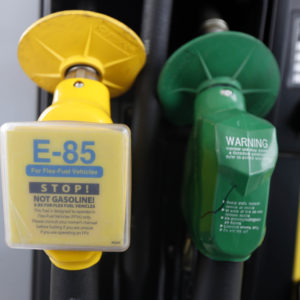On May 30, President Trump announced the end of the EPA moratorium on the summer sale of 15 percent ethanol-gasoline blends in U.S. markets. The president’s executive decision brought cheer to a farm community pummeled by his trade war with China and opened the valves a bit wider for the flow of corn-based ethanol production. But in months prior, the administration had expanded the use of ethanol exemptions by refiners, which understandably prefer to run 100 percent petroleum.
It is interesting how the political use of the same regulation — toughening here, softening there — can help pacify different special interest groups. As president, Trump can have it both ways, and the decades-old ethanol odyssey entangles every administration in one way or another.
Ethanol blends have been required since 1978 as part of a federal program intended to improve certain tailpipe emissions. Indeed, when first initiated, federal support of ethanol (then with taxpayer money) was justified on the environmental grounds that farm-produced ethanol was far cleaner than driller-produced oil.
Those early proponents failed to account for the energy used to plow, harvest and convert corn to ethanol, which turns it into an environmental loser. After years of study, the environmental community reversed its initial glowing support and now opposes ethanol production, as do members of the American Petroleum Institute.
Even America’s leading political environmentalist, former vice president Al Gore, artfully endorsed ethanol-based fuel as a win-win proposition for farmers and the environment when running for president in 1987. Like many politicians, Gore gave his ringing endorsement in the heat of the campaign in Iowa, the center of America’s ethanol heartland and home of the pivotal early presidential caucus.
Gore later recanted, saying, “One of the reasons I made that mistake is that I paid particular attention to the farmers in my home state of Tennessee, and I had a certain fondness for the farmers in the state of Iowa because I was about to run for president.”
Failing the environmental test, the ethanol mandate had also been promoted as a way to conserve America’s petroleum reserves, since made plentiful by the shale oil revolution. We are now the world’s largest petroleum-producing country, and the world seems to be running out places to store the stuff.
Like Gore before him, Trump made his announcement at a political rally in Iowa. In sharing the good news for Corn Belt farmers, he brushed against the now-obsolete but nonetheless politically appealing logic for requiring U.S. gasoline buyers to pay more at the pump: “Energy independence is a requirement if America is to become great again.”
Rather than basing its own announcement on environmental or supply justifications, the EPA creatively offered another reason: consumer choice. In the agency press release, EPA Administrator Kevin Wheeler said, “As President Trump promised, EPA is approving the year-round sale of E15 in time for summer driving season, giving drivers more choices at the pump.” Of course, most gasoline shoppers know that there is seldom if ever a choice at the pump between ethanol-free versus various blends of ethanol gasoline. Even so, the idea sounds good.
The fact that something as mundane as buying a tank of gasoline would be infected with presidential politics — and has been for 40 years — highlights the impossible task faced by reformers who would clear the path for a more sensibly regulated economy.
As things stand, the politically entangled U.S. economy is the result of what it takes to get elected in a world where politicians in power can impose their will. And that is not likely to change any time soon. After all, creative politicians can gain support for first imposing rules and then later relaxing the same rules for their favorite interest groups.
Indeed, no one is even keeping score.

